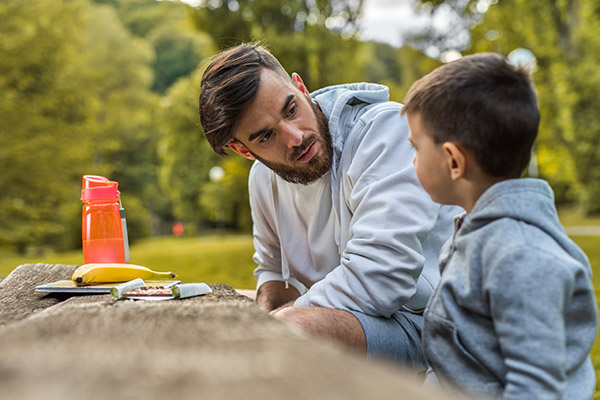


Alas, there's no magic pill for talking to your kids about drugs - a conversation that is more important than ever given all kinds of drugs are being laced with fentanyl, a new deadly entry to the market.
"Sometimes parents don't talk to their kids about drugs because they believe they've taught them to make good choices. For other parents, there's ignorance about the risk, especially when it comes to fentanyl," says Troy Janzen, '90 BSc(Spec), '92 MEd, '00 PhD, an educational psychologist at the University of Alberta.
The terrifying reality is the opioid is everywhere. And just 2 milligrams - an amount equal to two grains of sand - can kill you.
Of the 343 fentanyl-related overdose deaths in Alberta in 2016, roughly 10 per cent of the victims were under 19. The overall number of overdose deaths in all age categories is likely higher but unknown due to backlogs in gathering data, says Elaine Hyshka, '07 BA, '16 PhD, an assistant professor and addiction specialist with UAlberta's School of Public Health.
"Strong parent-child bonds and open communication are protective factors against adolescent risk behaviours, like drug use," she advises.
"Instead of telling your kids all drugs are bad, focus on helping them to recognize it's important to make intelligent choices around what you're doing." - Troy Janzen
With that in mind, here are six expert tips for broaching the subject.
1: Encourage good choices no matter the age
"Talking about alcohol and drugs when kids are young is important," says Janzen, who recommends bringing up substance use around the age of seven. Kids are more likely to encounter drugs at an older age but, he adds, "you never know. My son and his friend were offered cocaine on a trip to the corner store to buy ice cream at the age of 10. Thankfully, they knew enough to refuse."
2: Be straightforward and simple
Focus messaging around understanding how to make healthy decisions. For example, Janzen suggests, "when you're eating a nutritious food, discuss how it's healthy and then ask them if they know something else that is not healthy for our body. Start with cigarettes and lead up to other substances like alcohol and drugs."
3: Explain that all drugs are potentially dangerous.
Debunk the myth that some street drugs are safer than others and explain that fentanyl is turning up in all types of drugs, not just opioids, says Hyshka.
"The illicit drug market is saturated with fentanyl," she says, adding that she's seen reports of it in methamphetamine, cocaine, MDMA (a.k.a. Molly or ecstasy) and heroin. Fentanyl can also be manufactured to look like prescription medication. Illegal drug manufacturers are putting it in everything because it's so inexpensive and highly addictive. Some dealers may not even know the product they're selling contains it.
4: Stress that abstinence from drugs is safest, BUT…
It's unrealistic to think that all teens will abstain. So it's important to stress to those who may be experimenting with drugs that they should never use them alone and only with people they trust. And, Hyshka says, "Make sure you emphasize that if anything ever goes wrong, to never be afraid to call 911."
Also, if someone chooses to use drugs, they should never mix them with alcohol. According to the latest Alberta statistics, 57 per cent of fentanyl overdoses in the province involved an additional substance. "Alcohol and fentanyl both depress the central nervous system, and mixing drugs makes their effects less predictable," explains Hyshka.
5: Check in regularly
Janzen recommends having a set time where you regularly have conversations with your kids, such as at the dinner table.
"If you have a set structure, there's more opportunity to create a dialogue where kids are more likely to tell you about things that are happening in their lives." Another tip is to bring up a story you read in the paper. "You might be surprised with the knowledge your kids already have."
6: Set limits
"Establish and state your family values in terms of how we should treat our bodies, including what we put into them," says Janzen. "Instead of telling your kids all drugs are bad, focus on helping them to recognize it's important to make intelligent choices around what you're doing."
And if your kids confess to having experimented in the past? "Don't overreact to the admission. Instead, keep them talking. You want them to understand that you are not angry, but not comfortable that they took the risk."
He adds, "At the end of the day, all you can do is encourage kids to make good choices, and you have to trust they eventually will."
Learn More
It never hurts to be prepared
- Find out more about fentanyl and its effects.
- Know the signs and symptoms of a fentanyl overdose.
- If you suspect your child or their friends may be experimenting with drugs, add a Take Home Naloxone kit, which can reverse an opioid overdose, to your first aid kit in case of emergency (available at pharmacies).
Related Articles
We at New Trail welcome your comments. Robust debate and criticism are encouraged, provided it is respectful. We reserve the right to reject comments, images or links that attack ethnicity, nationality, religion, gender or sexual orientation; that include offensive language, threats, spam; are fraudulent or defamatory; infringe on copyright or trademarks; and that just generally aren’t very nice. Discussion is monitored and violation of these guidelines will result in comments being disabled.